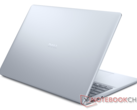Last month, Dell introduced its redesigned Plus lineup of 14-inch notebooks, and, at that point, there was availability only for Intel configurations based on the Lunar Lake processors, with prices starting just above $1,000. After a few weeks, the company expanded the processor option list with AMD’s latest “Krackan Point” APUs, bringing the starting price to $850 for the 2-in-1 form-factor. Now, Dell is lowering the entry point even more by introducing a regular non-convertible AMD-based variant that starts at $800.
The base configuration for the latest non-convertible 14 Plus model includes an AMD Ryzen AI 5 340 APU integrating a CPU cluster with 3x full Zen 5 cores + 3 Zen 5c efficient cores totaling 12 threads that can boost to 4.8 GHz. This APU aso features the 4-core Radeon 840M iGPU based on the RDNA3 architecture plus an updated NPU with 50 TOPS processing power that ups the total APU power to 59 TOPS.
Also included in the base configuration are 16 GB of LPDDR5-7500 RAM and a PCIe 4.0 NVMe SSD with 512 GB capacity. Additionally, Dell offers a Ryzen AI 7 350 with 8 cores and 14 threads plus the 8-core Radeon 860M iGPU along with a 1 TB SSD for $950, while the 32 GB RAM configuration with the more powerful APU and 1 TB SSD is priced at $1,150.
As with many OEMs, the AMD-based models differ slightly from the Intel-based ones in terms of ports and features. Unlike the Intel models with Lunar Lake that feature a 2560 x 1600 IPS display option, Thunderbolt 4 and HDMI 2.1 ports, the 14 Plus models equipped with AMD APUs are limited to 1920 x 1200 displays, 2x USB-C 10 Gbps connectors and an old HDMI 1.4 video output. Moreover, the Intel models also come with slightly faster LPDDR5x-8533 RAM modules.
Otherwise, the AMD variants feature a decent 1080p webcam, fast Wi-Fi 7 + BT connectivity, fingerprint sensor on power button, and a 64 Wh battery that should last at least 12 h for day-to-day use cases. Chassis is rather slim with 0.7-inch (17 mm) profile and total system weight is only 3.35 lbs (1.52 kg).
Source(s)
via Liliputing



















